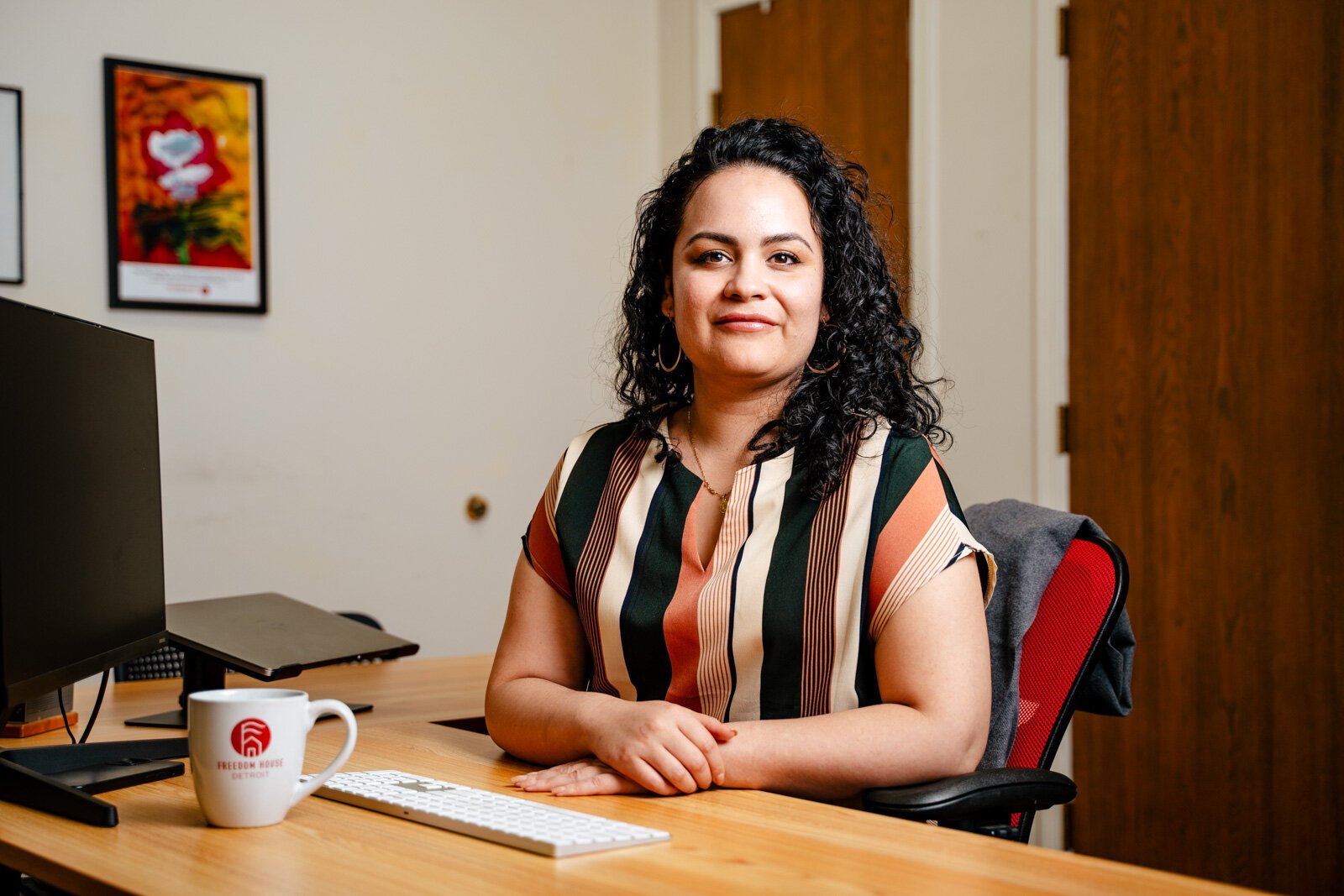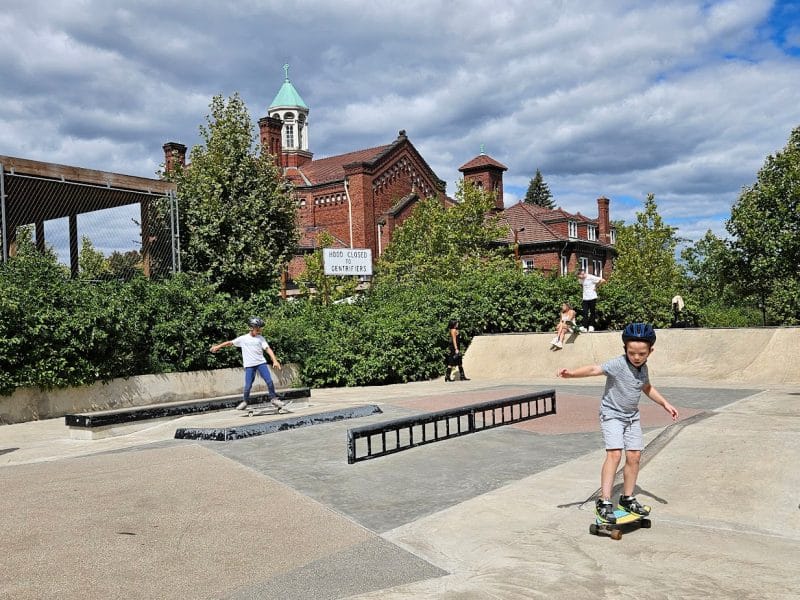Freedom House Detroit raises a passionate new leader while navigating the loss of critical funding
"On an international border, we're only going to continue seeing refugees, asylum seekers and those seeking humanitarian relief," says Elizabeth Orozco-Vasquez, CEO of Freedom House Detroit. "This is a huge service we provide in the city. We need to remind people these are members of our community."

Freedom House is the only full-service asylum agency in the border city of Detroit, and in the state of Michigan. We began in 1983, when many refugees fled the bloodshed of the Salvadoran Civil War to seek asylum in the U.S. Over the past four decades, those needing refuge have continually changed. We have about 21 countries represented by the people living at Freedom House today.
An asylum seeker has left their home country in order to survive. They’ve been persecuted because of their gender, religion, political affiliation or tribe. Ninety-eight percent of our clients have been tortured, and many have families who are being threatened and persecuted back home. Unlike immigrants pursuing the American Dream, our clients are looking for safety, and have had to leave everything to find it.
Freedom House provides a unique range of comprehensive support services. Under one roof, our clients receive shelter, food and clothing, as well as legal aid, case management, mental and medical care, job readiness, housing relocation, transportation and English classes. Because we have an interdisciplinary team working together, we’re able to build a strong case for people to apply for asylum. On average, nationally, less than 30 percent of affirmative asylum applications are granted. But, accompanied by our staff who provide moral support and legal aid, our clients see double to triple that success.
Asylum seekers who don’t find places like Freedom House often end up victims of human trafficking, exploited through labor or sex. They aren’t eligible for mainstream social and health services, or to work in the U.S. until they get authorization, which can take six months to a year for approval. It’s very difficult to live up to a year without being able to legally work. We connect our clients to local volunteer opportunities that build their experience and their networks. When they’re eligible for work, we help place them in employment that pays a living wage.
COVID-19 has basically shut down immigration courts and asylum offices. One or two appointments trickle in, but for the most part, our clients are being rescheduled. Imagine you’ve long been waiting for this date on the calendar, only to be told you have to keep waiting until next year. It’s devastating. We’ve had to work really hard with our clients on mental health issues during the pandemic’s cancellations and delays. As they battle depression and feelings of hopelessness, we strive to be a network of support.
I stepped into the role of CEO at Freedom House about a month ago, previously having been chief operating officer. When our longtime CEO decided to retire, I was honored to find out she’d recommended me to replace her. I’m an immigrant myself. I came here from Mexico in the 1980s with my sister, and my mother, who was seeking a better life for us out of poverty. The more I learned about Freedom House, I kept seeing myself and my family in the clients’ stories. It was so powerful.
Being a person of color truly draws me to justice work where I can feel I’m making an impact every day. When we announced the transition, I had an outpouring of support from Latinos, and Latinas specifically, messaging to say, ‘Hermana (sister), I can’t wait to see what you’re going to do next.] Or ‘I’m so proud to see a Latina in a leadership role.’ It just makes you realize how much representation matters, in our communities especially. When my mother heard, she started crying and she said, ‘This is why we came here.’
I’m really proud of my team. During the pandemic, we each became essential workers. It was all-hands-on-deck work to keep people safe and care for those who ended up getting infected. Although it’s been hard, COVID-19’s given us the ability to think and talk, and to get client and volunteer feedback. We’ve realized we are not a typical shelter, but truly transitional housing, which means we work inside our client’s home. They don’t live at our workplace. We’re thinking about how to honor that space, even with our volunteer opportunities, in a way that gives our clients the consistency of privacy they desire.
We’ve already heard reports of Ukrainian asylum seekers and refugees coming through the southern border. Yet, this year, we lost $400,000 of funding from the U.S. Department of Housing and Urban Development (HUD). This was a huge hit to our budget. HUD’s funding has, over the years, leaned more toward permanent supportive housing programs. We know that model is important, especially for the chronically homeless community. But we need new transitional housing funds for organizations like ours, that serve very vulnerable populations who only need our services for a short period of time, and who aren’t eligible for that funding.
So we’re asking people to contact their local congressperson to petition for help for these populations. We’re also asking for donations, even if it’s $10 a month, to help us keep the lights on, food on the table, and to make sure we can continue taking our clients to Chicago for their asylum interviews. I’m encouraged by the supportive community around us. When I hear people ask how they can help, it reminds me we’re not alone. We have this team behind us, and in our need, that outcry of support is what keeps me going.
We’re still appealing with HUD to support transitional housing initiatives in Detroit. On an international border, we’re only going to continue seeing refugees, asylum seekers and those seeking humanitarian relief. This is a huge service we provide in the city. We need to remind people these are members of our community. Other shelters are not equipped or prepared to handle asylum seekers, nor should they. Their hands are full caring for our city’s homeless populations and our veterans. We know how to provide for our clients, but we need the funding to be able to continue.
Elizabeth Orozco-Vasquez is the CEO of Freedom House Detroit. This entry is part of our Nonprofit Journal Project, an initiative inviting nonprofit leaders across Metro Detroit to contribute their thoughts via journal entries on how COVID-19, a heightened awareness of racial injustice and inequality, issues of climate change and more are affecting their work–and how they are responding. This series is made possible with the generous support of our partners, the Michigan Nonprofit Association and Co.act Detroit.





